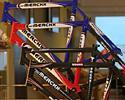
Recently on Cyclingnews.com |
An interview with Eddy Merckx, May 22, 2005
An audience with the King
It's almost 30 years since he retired, but Eddy Merckx' record still over-shadows that of any rider before or since. As Shane Stokes discovered he's as happy to look back on his staggering career as to comment on the riders of today, but is reluctant to make comparisons.
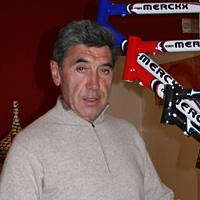
|
Lance Armstrong may have moved ahead in terms of outright Tour de France victories last summer, but even a cursory glance at the palmares of Eddy Merckx shows that he is the colossus in the sport of cycling. Over the course of his career the Belgian champion took a staggering sequence of victories, netting five Tour de France titles, five Giro wins, one Vuelta a Espana, four world championships (three professional, one amateur), seven Milan-San Remos, five editions of Liège-Bastogne-Liège, three Paris-Roubaix, two Tours of Flanders and Tours de Lombardy apiece, countless stage races, 17 six day titles plus the world hour record. Merckx was easily the most dominant athlete the sport has ever seen, crushing his rivals underfoot during his peak years and winning 445 professional victories. With an array of results such as these it was clear that Merckx's pronouncement last year that Armstrong was the better rider was somewhat over generous; in this era of specialisation, the Texan made have made the Tour his own, but he is still a long way off equaling the feats of Le Cannibal.
"In my time we had to do more races because there wasn't as much money. It was normal back then. "- One reason why Eddy Merckx won so many races. |
Cyclingnews met up with Merckx several weeks ago at the Riccione Bike Hotel camps in Italy. The Belgian champion is a partner of the group, which provides a top class training environment for riders from all over the world. Participants of all nationalities were in Riccione for the camps, and these jumped at the chance to rub shoulders with their hero. Watching the awe with which they regarded Merckx showed just how much he is respected and revered within the sport; the riders hung on to his every word, beaming like demented Cheshire cats when they had an opportunity to have their photo taken with him, and turned up in their droves when he agreed to go on a quick ride.
As you might expect, Merckx is a fascinating interviewee. The chance to get inside his head, to find out what made him tick is a rare one; spending half an hour picking his brains about his own career and the modern era was, to put it simply, a treat.
Cyclingnews: Eddy, first off you are looking very fit. Are you doing much on the bike?
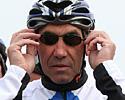
|
Eddy Merckx: Not a huge amount. I am riding at the weekends and sometimes training during the week. It depends on what is on. With trips like this, I don't have so much time. And with 29 people in the factory, I'm very busy there too.
CN: You had an incredible career, with 445 wins.
EM: As a professional, yes. I had about 100 victories as an amateur. Also, on the track, 17 six days and various championships.
CN: Those wins included five Tours de France, five Tours of Italy, one Tour of Spain, three world championships, countless Classics, six days. What drove you, what made you the person you were?
EM: Well, genetically it was because my parents gave me something more than the others. Also, I was training hard, working hard on the bike, always doing what I could to improve. That is why I became such a good rider. In truth, you can have as much talent as you like, but that is not enough. You have to work as well, and start every year from zero. Each year, you don't know what is in store. This was especially after 1969 when I had a bad crash on the track in Blois. Things weren't so easy then.
CN: How did that crash happen?
EM: The Derny in front of us broke his pedal and so he crashed. We were going about 60 kilometres an hour (pauses). We crashed into him on the bend, went over. My trainer was killed, immediately, but I was lucky. I was still alive.
My hips were twisted. I had to stay six weeks in bed, and then start again. In that time, there was not the same level of physiotherapy. So I started again with my hips completely wrong. It made it very hard after that, because I don't think after the crash I was as good as before. Especially in the mountains. I was suffering more because I always had problems with my back.
CN: There are many photographs of you taken during races of that era, adjusting your bike position.
"In the winter I raced a lot on the track. I did a lot of six-days. I would go on vacation to the mountains where I did cross-country skiing. So I was always busy. "- Eddy Merckx on his "ride your bike, ride your bike, ride your bike" training regime. |
EM: Yes, that is because of my crash. It was only a few years after that when I learned that my hips were turned. I tried to get it fixed, but it was very late.
CN: Do you consider that you were different, mentally, than the other riders? You say that your parents gave you the right genetics, but you think that psychologically you were different, stronger, more determined?
EM: I don't know... I think all the big riders, such as Gimondi, were also determined, also strong. What makes the difference is the natural ability. Everybody does what they can, but it is nature which makes the difference between them.
CN: Your time was a era when perhaps people weren't so fit going into the season, maybe they would arrive a bit overweight. You, on the other hand, trained very hard over the winter, a bit more like the riders do today. Maybe you were ahead of your time?
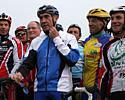
|
EM: Well, in the winter I raced a lot on the track. I did a lot of six-days and only rested for two to three weeks. I would go on vacation to the mountains, but when I was there, I did cross-country skiing. So I was always busy.
With regards weight, it is difficult if you put too much on in the winter to be good at the start of the season. That is why I did so well in Milan-San Remo, because I was racing in the winter. Maybe the other riders were not doing as much. I was racing on the track and generally kept in shape, so after 250 kilometres I could beat them.
CN: You took seven wins in Milan-San Remo, so that proves the point. Pretty impressive. But if you had to single out the three best victories of your career, what would you say they were?
EM: Ah, for sure, one is the 1969 Tour de France. That was the best one. The second one would probably be the hour record, because I beat the hour record of Ole Ritter by 700 metres.
The third... [deliberates for several seconds]... maybe the world championship in Montreal. That was after a big season, I won a lot of races and also, after the Tour de France, I think I raced for 34 days and then went to Canada and became world champion for the third time.
So maybe that one, or perhaps when I won my first Tour of Italy. That was important. When I won the stage to Tres Cime di Lavaredo, that was the best stage that I did in my career.
CN: You were incredibly dominant in the 1969 Tour. You won the three major competitions - overall, points and mountains. And if they had had a prize for best young rider back then, you would also have taken that award.
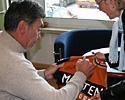
|
EM: Sure. I was 24 then.
CN: Did you expect to be quite as dominant in that Tour de France?
EM: You know, I think after I won the Tour of Italy in 1968... it was a very hard Tour if Italy, with very tough mountains. They dropped me from the Tour of Italy in 1969 when I was very strong. [He pauses, referring to the doping positive he always denied.] I was very mad with what happened to me in that Tour of Italy. I was more motivated than ever. So I went to the Tour de France and passed the tests every day. I won that race by 17 minutes and 52 seconds. For me, that was important.
Also, it was also 30 years since a Belgian rider had won the Tour de France. So it was a dream, a gift. The yellow jersey was magic. To win the Tour de France after all that was the most beautiful thing in my career.
CN: What was the reception like when you went back to Belgium?
EM: In Belgium it was great. But also when I arrived in Paris for the end of that Tour. There were 25,000 people crying 'Eddy, Eddy' [smiles]. It gave me goosebumps. Then, the day after, I was received by the King. It was fantastic.
CN: What opponent did you respect and/or fear most back then? Maybe we can start with the Tour.
EM: It depends which year. It was different each time. In 1969, Pingeon was second. After that, Zoetemelk was there a few times, there was Thevenet, Ocana, Poulidor was also second, once.
CN: And in the Classics?
EM: In the Classics, De Vlaeminck, Godefroot, Leman, Gimondi, Bitossi, Motta. A lot of Italian riders were very good.
At that time, the riders rode all the races. So there was big competition. It was not that you had only riders for the Classics and riders for the Tour de France. Maybe only one, Van Impe, was only doing the Tour de France. But all the rest were doing the Classics. So it makes it much harder, there was more competition.
Now, we have riders only doing the Classics. If you look at Paris-Roubaix, there are maybe only a few riders from the top of the UCI classification who do that race. But when we rode, all the best riders were there at the start of Paris-Roubaix. That made it more difficult, too.—
CN: When you look at your Tour de France record, you have some pretty amazing achievements. In 1969 you took each of the three classifications (overall, points, mountains), in 1970 the yellow and the mountains and then yellow and the points in both 1971 and 1972. It shows an incredible dominance. Then, when you think of all the other races you were doing - and winning - in each year, it shows how far you were ahead of the other riders. There was a quote last year when you said that you think Armstrong is a better rider than you. Was that serious, or was it tongue in cheek?
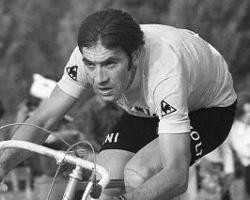 |
EM: Well... I think you cannot compare different eras. You cannot compare Coppi with me, you cannot compare me with Indurain, LeMond. So I think the most important thing is to be the best when you are riding. I think I was the best when I was riding.
I never based my career only around the Tour de France, I tried to win as many races as was possible, Classics and everything. So, in that time it was impossible to pick and choose. The sponsor would not accept a rider only doing the Tour de France.
The Tour de France has become much bigger now that in my time. For example, there are more journalists at the start of the Tour de France now than ever before. You can't compare the two eras. Maybe if I was riding now I would also do things differently. Fewer races, for sure. In my time we had to do more races because there wasn't as much money. It was normal back then. I don't know why cyclists did not receive as much money as other sports. But it's very different now.
CN: Do you think that the ProTour will help move things back more the way they were?
EM: No. I don't think so. There is no guarantee to have the best riders at the start. The best teams, yes, but not the best riders. I think the ProTour is good for the teams, to be sure to be in the Tour de France, but you don't know which riders you will have at the start of Milan - San Remo. Look, Armstrong wasn't at the start of Milan-San Remo. So it is no guarantee.
CN: If you were racing in the modern era, against an opponent such as Armstrong, would you do things differently than his modern rivals do? Should they change their tactics?
EM: I don't know. I never rode with Armstrong so I can't say.
CN: You are close to Lance..
EM: Yes...
CN: Do you think you are similar mentally, do you see similarities?
EM: Yes. We are both winners. Also, before Armstrong had cancer, he was World Champion at a very young age. He won Fleche Wallone. He won stages in the Tour de France.
Since cancer, he is mentally stronger. He lost a lot of weight and that is why he becomes a better stage-race rider.
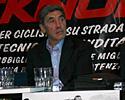
|
CN: What do you think drives him?
EM: Winning. I think he wants to win.
CN: Of the other modern riders, who impresses you?
EM: There are some good riders. Bettini is a champion, a very good rider. Petacchi has been fantastic, very strong since the beginning of this season. He is very strong. He is a very good sprinter.
You have young riders like Cunego, I expect a lot of him. Also riders like Tom Boonen. Maybe he's not a Tour de France winner but he is a complete rider.
CN: Because you were so dominant and revered, do you think it has made it more difficult for Belgian riders, always having that pressure to be the new Merckx?
EM: I don't think so. Because when you have a big sportsman, young people try to be like him too.
I think it is also the mentality - maybe life is too easy in Belgium now. It's also a small country, and the traffic is getting heavier. My time, a long time ago, football was number one, it is still number one, cycling is number two, but you have basketball, you have handball, you have tennis. A lot of young people are going to other sports. So you have more competition, and the levels of new riders go down.
CN: What made you choose cycling?
EM: I don't know. I liked it since I was a kid, I dreamed of being a cyclist.
CN: Did you have heroes?
EM: Yeah. I listened to the radio, watching TV was not possible in that time. I followed the cycling, especially during the Tour de France, riders like Ockers, Bracke, et cetera. riders which made good publicity. I would read about them. Since I was a kid I was dreaming of being a cyclist. Even though, in my family, nobody was a cyclist.
CN: Your son, Axel, has had some good performances such as his Olympic medal last year. He has done very well, because I think to be the son of Eddy Merckx must be a very hard thing.
EM: Well, it was his choice. It was not my choice. He chose to do that. Yeah, I think it is not an easy way. he could have an easier way, but he wanted to make his own life. I think it is great for him.
CN: Finally, what you think is the future of Belgian cycling. Do you think it is progressing?
EM: Well, I think we have a few good young riders, like Boonen. He is very good for the Classics. Philippe Gilbert is good, and you have Monfort, you have Nuyens, winning Het Volk. You have Van Summeren, who is also a good rider. Belgium has some good riders at this moment so things are looking okay.
Further reading
Eddy
Merckx: Back in the saddle (September 2004 interview)
Eddy Merckx: The one
and only (February 2004 interview)
The five-times
club: Eddy Merckx (July 2003 retrospective)

